A Farm-City Celebration has been held annually in Jackson County for the past 48 years. Last year the recognition was virtual via a social media video, but this year’s celebration was a public breakfast once again. The Jackson County Chamber of Commerce, Farm Credit of Northwest Florida, Jackson County Farm Bureau, and UF/IFAS Extension Jackson County recognized 10 farm families with awards in 2021. The following highlights were compiled from contributions from the farm families being honored, and the cooperating agency personnel that selected this year’s slate of award winners at the annual Farm City Breakfast, that was held November 19, 2021.
–
Farm-City Scholarship – Justin Clikas
The 2021 Ed Jowers, Future of Agriculture Farm-City Scholarship was awarded to Justin Clikas. Justin is a 2020 graduate of Marianna High School and is currently enrolled at Chipola College.
Justin grew up on a small farm near Marianna. His family has a satsuma grove consisting of about 500 trees. Justin has helped fertilize the trees, pick the fruit, and also keep the trees trimmed and sprayed for insects.
During his middle school years, Justin showed hogs for 3 years. His best hog won reserve champion at the Panhandle Youth Expo.
While Justin is currently studying to become an Orthodontist, he would like to eventually take over the family farm business too.
Each year the Jackson County Chamber of Commerce awards the Farm City Scholarship to a recipient displaying exemplary scholastic, extracurricular, and agriculturally centered achievements.

–
Outstanding Farm Family – Dan and Pat Pelt
Daniel Pelt grew up on a century pioneer farm in the Poplar Springs area. He and his wife Ruby were both educated and were teachers who had three children Roland, Romoney, and Dan. In 1944 they purchased the farm on Reddoch Road to provide food and additional income for their family. In the beginning the farm was more like a homestead with swamps and woods and only 17 acres of cleared land. They farmed crops with mules and grew chickens, hogs, and cows. They grew corn and peanuts to feed the livestock and sell as a cash crop. Adjoining acreage to the farm was purchased in 1950 bringing the total of the farm to 240 acres, but at that point, only 17 acres were cleared from crop farming. To expand their tilled land, Daniel borrowed his father’s BF Avery tractor to clear land, but he never drove it, instead he put 12-year-old Dan on the seat, and he has been driving tractors ever since. A few years later they purchased a 1935 John Deere Model A tractor so they could expand their crop land to 60 acres. Not only did Dan become the family tractor driver, but he also had to learn how to do the repairs when equipment broke down.
Life on the farm for Dan was not all chores and farm work. As a boy he fell in love with the family land by exploring the woods and swamps and watching the wildlife. The family farm became much more than a place to work and feed the family to Dan. It was his wild place for adventures with his friends. Dan figured out how to earn some spending money by catching live rattlesnakes and turtles to sell to the Ross Allen Institute. They would get $1/ft for snakes and 10¢ each for turtles at the country store in Cypress. This land provided all the joy and adventure a young boy could ask for and became his happy place for life.
Dan only left the Pelt Family Farm for a 3 ½ year term in the military and then for two years when he was a student at Troy University. While a at Troy his parents let him know that they had an offer to purchase the family farm. He went home that weekend and had a long talk with his parents and decided he wanted to farm the land. Dan farmed on the weekends to keep the farm going until he graduated.
In 1960 Dan started farming full-time. He knew all about tractors, planting and field work, but he did not know the economics of farming. He borrowed money to operate and to purchase an additional 80 acres and equipment, but he stayed in debt until 1990. When he started farming, he followed the same plan as his father growing with a mix of crops and livestock. He devoured every issue of Successful Farming and Progressive Farmer magazines from cover to cover to learn ways to improve his operation. In 1964, he grew his first twin-row peanuts and then had his first 2-ton/acre peanut field. Later Dan decided to specialize in producing hogs, but that did not go well. In 1975, Dan sold off his cattle and took a job with the Florida Department of Agriculture, so he farmed crops part-time and worked full-time. He found work closer to home and started working for Florida Foundation Seed north of Marianna, where he remained for the next 21 years. However, he never stopped farming.
His work with Foundation Seed showed Dan a niche market in the farming industry growing certified seed rather than commodity crops. This was something he thought he could make work. He grew foundation peanuts to sell certified seed to buying points, and soybeans, and oats for certified seed to sell to area farmers. In 1992, he planted his first field of Foundation Tifton 9 Bahiagrass seed to produce certified seed to sell to area ranchers. After years of trials and error, this finally was the niche that fit Dan’s management best. He grew peanuts and bahiagrass in rotation from foundation stock to sell certified seeds of these two crops. Eventually he specialized solely on producing bahiagrass seed, and this what he is still known for today. He has kept the same land line phone number for years, because every year he gets calls from past satisfied customers seeking seed for new fields they want to plant.
When Dan started growing bahiagrass for seed there was not a lot known about how best to manage this crop. There was very little research data on the best fertilization practices. Like most everything else Dan did in farming, he studied and experimented until he figured out the best practices such as the best seeding rate for planting and optimal fertilization rates and timing. His best seed harvest ever was 500# of bahiagrass seed per acre, but there were other years when yields would drop to 100# or less based on the climate that season. When Dr. Ann Blount released the new Riata bahiagrass variety, Dan was one of the foundation seed growers that had a contract with Reagan and Massey, the company that purchased the exclusive rights to this variety. He grew 200 acres of Riata and was one of the few farms that helped get this new variety available for ranchers to plant.
Starting in 2008, Pat his daughter, moved back to the farm to work with her dad. She started a hay business using the bahia fields after the seed was harvested. In 2010, she took over the day to day management of the farm and found her niche selling certified seed and bahiagrass hay to local ranchers. She operates a seed cleaner and produces high quality seed to meet the demands of the contract with Reagan and Massey, while also producing Tifton 9 seed for area ranchers. Pat’s son, Lee Johnson works with her now on the farm part-time focusing particularly on the hay business. Dan still lives on the farm and offers sage advice and assistance, but said, “The future of this family farm will be what Pat and Lee make of it.” Pelts have been farming in Jackson County for centuries, so the legacy of this farming family is in good hands.
The Outstanding Farm Family is selected by the Jackson County Farm Bureau each year through a committee of past recipients of this recognition.
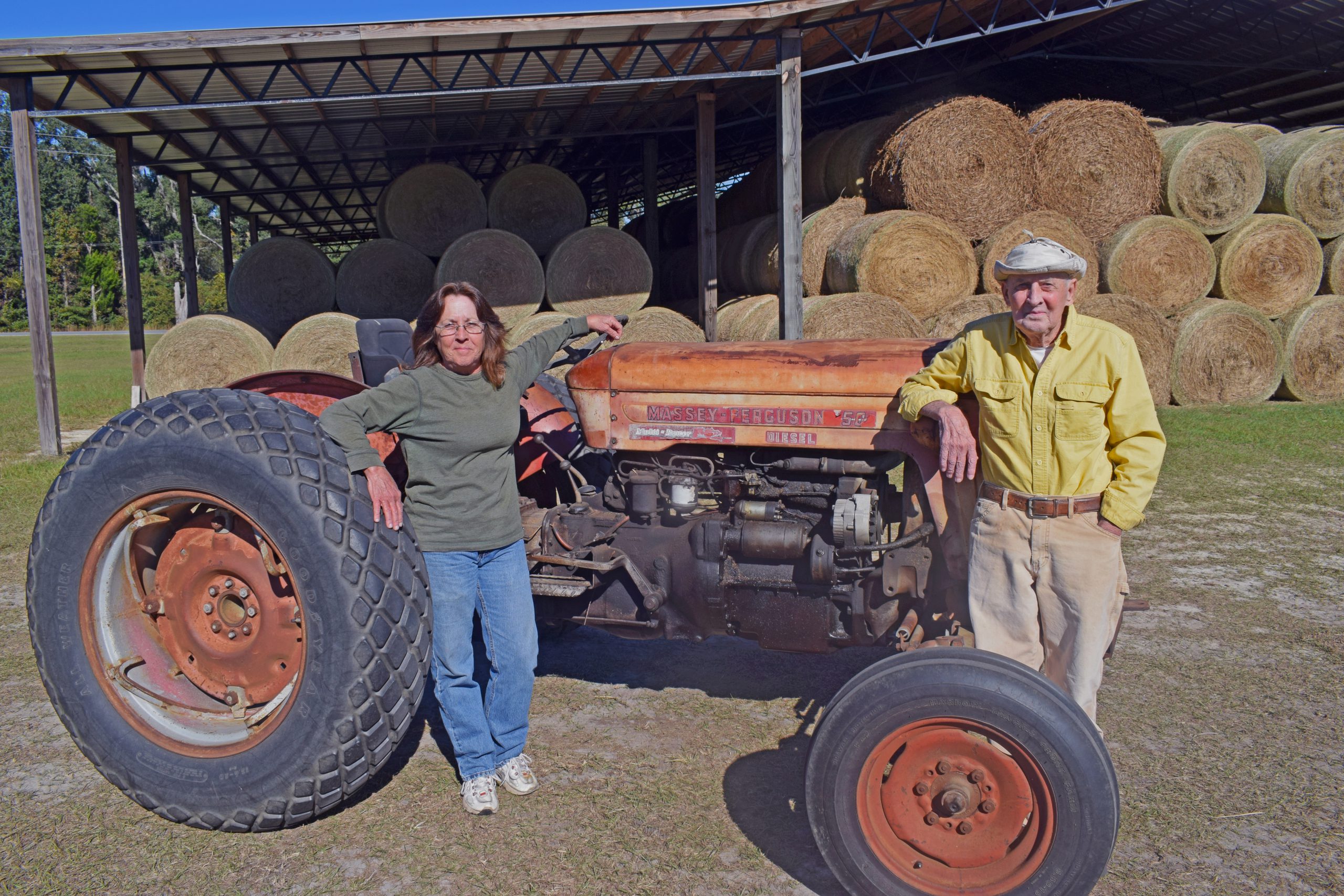
–
2021 Peanut Farmers of the Year – Chris and Tammy Long
Chris Long is a 7th generation Jackson County farmer. After graduating from High School, Chris bought a farm in Seale, Alabama but in 1984 moved back home to Jackson County to farm the family land near Bascom. Chris & Tammy met while she was working at the Farmer’s Bank of Malone and were married in 1992. Afterwards, she began working by his side on the farm and managing all the bookkeeping. Chris and Tammy have been married nearly 30 years, with their milestone anniversary coming up on January 4th.
Today the Long’s farm 425 acres utilizing a peanut/cotton crop rotation with pastures for their 150 head beef cow herd. In 2021, the Longs grew 150 acres of peanuts, planted on 36” single rows. They grew one variety, TifNV High O/L, which is nematode resistant and has good disease resistance. Their peanut crop is grown for the open market. Part of their farm is dryland production, but this year all of their peanuts were under irrigation in the fields near their home. Historically, the farm averages 4,500 lbs./ac of peanuts. They are hoping to at least maintain that average this year as well, but the heavy rains this summer have made that challenging.
The Longs own their equipment and have no other employees. Chris and Tammy both take part in the land preparation. Chris does the planting and the spraying while Tammy assists with the seed handling at planting and acts as the chemical assistant preparing for each spray application. When it comes time for the harvest, their favorite part, they each run a digger plowing up the peanuts and they both take part in the picking with his and hers KMC Peanut Pickers. Chris and Tammy love every aspect of farming, being able to work together, raising cattle and growing different crops, but by far their true passion is growing peanuts. They are so passionate about peanuts that Tammy even dressed up as “Mr. Peanut” for Halloween this year.
Recognizing the importance of land stewardship and sustainability to farming, the Longs have integrated cover crops and conservation tillage into their farm system for the past 19 years. They are members of the Florida Peanut Producers Association and the Jackson County Farm Bureau. They are also members of Sowega Cotton Gin, and have served as a field test farm for new PhytoGen cotton varieties.
Like other farmers in Jackson County, they were dramatically impacted by Hurricane Michael in 2018. Just one short month later they also went through a devastating health scare with Chris. They are truly thankful for the prayers and support from their friends, families and their fellow farmers that have helped them through this difficult time in their lives. Above all, they want to thank God for their continued success and happiness. Without him none of this would have been possible. Together they have shared both good times and hard times but are always able to lean on one another for support and to remain strong in their faith.
The Peanut Farmer of the Year Award is selected annually by the Jackson County Extension Service with the assistance from the Florida Peanut Producers Association.
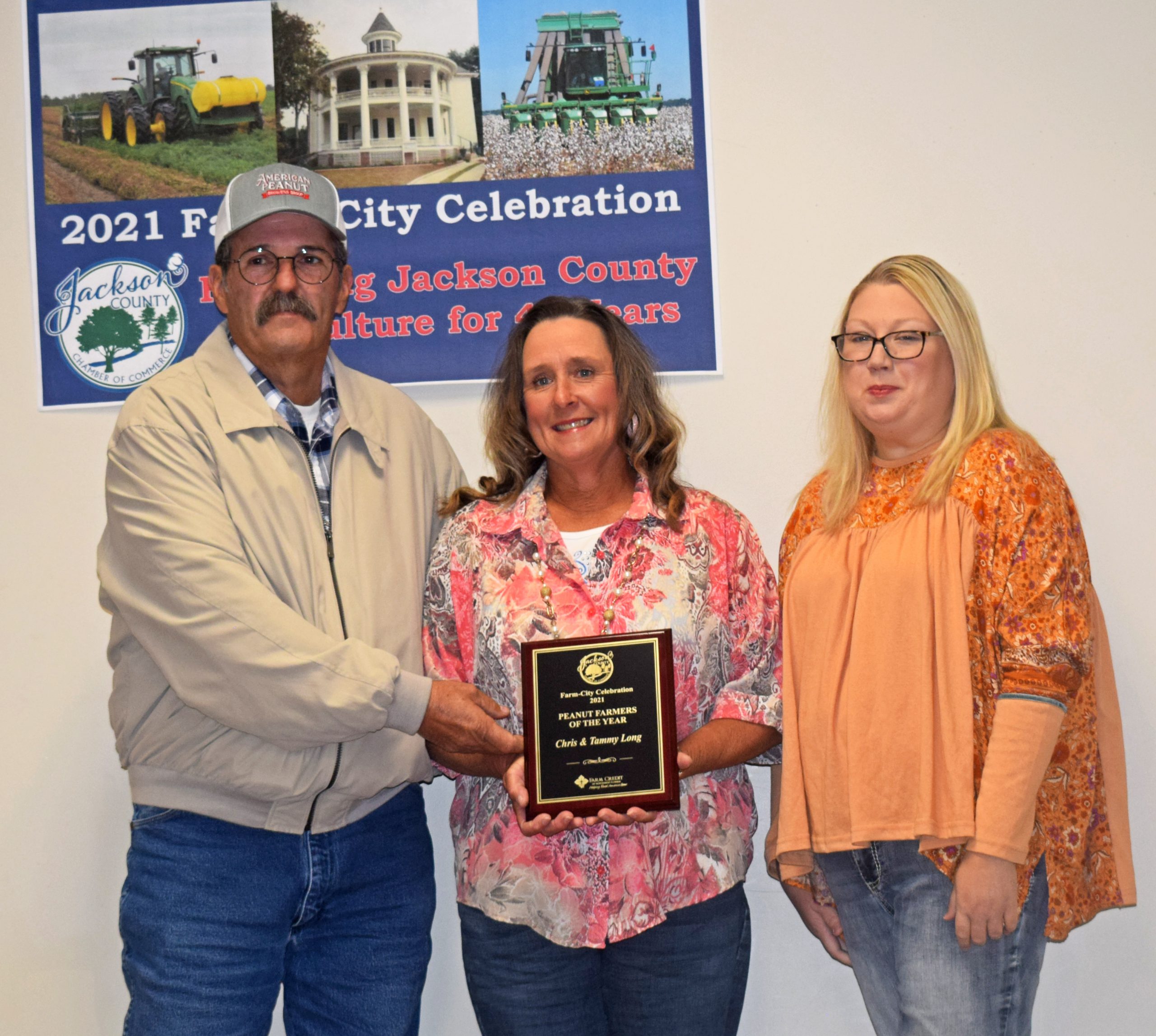
–
2021 Cotton Farmers of the Year – McArthur Farms
This year’s Cotton Farmers of the Year are the father-son team of Larry & Jim McArthur. Larry has been involved in agriculture all his life. He started farming when he was 18. Larry began his farming career growing peanuts and added cotton in 1991. Jim has helped on the family farm from a young age and joined the farm full-time when he was 24.
Larry and his wife Pam have been married for 46 years and have 3 children: Joanna, Jennifer, and Jim. Pam tends to the books of the farming operation and helps manage McArthur Company, the farm supply store that she and Larry own in Malone. They have also been blessed with 5 grandchildren. Jim and his wife Damara have been married for thirteen years, and have three children, Atlynn, 10 years old, Cassidy 6, and Ellie Rose 2 ½. Damara works as a stay-at-home mother and is currently homeschooling Atlynn and Cassidy.
Larry and Jim currently farm 1,500 acres, consisting of cotton and peanuts. Their operation includes two employees, Keefe Hatcher and Jeff Miller. Jim also produces regular video content to highlight things around the farm on his YouTube Channel entitled Field Rows. If you haven’t watched any of his videos, you really need to check out his channel! The family and employees all make appearances. Locally, Larry & Jim are both members of Cloverleaf Gin, the Florida Peanut Producers Association, and Farm Bureau.
Jim says, “I really enjoy going to work with my father every day. It’s rare for that type of partnership nowadays.” This year, the duo grew 800 acres of cotton, 456 acres of peanuts and 244 acres of oats and wheat. Today, their farm is 90% irrigated, and they grow Delta Pine and NexGen cotton. This year, they added pop up fertilizer to their crop during planting. Harvest is going well for them this year, they currently have around 130 acres left to pick. They are hoping for over a 2-bale average this year, which is normal for the farm.
The Cotton Farmer of the Year is selected each year by the Jackson County Extension Staff with the assistance of the local cotton gins and ag supply dealers.
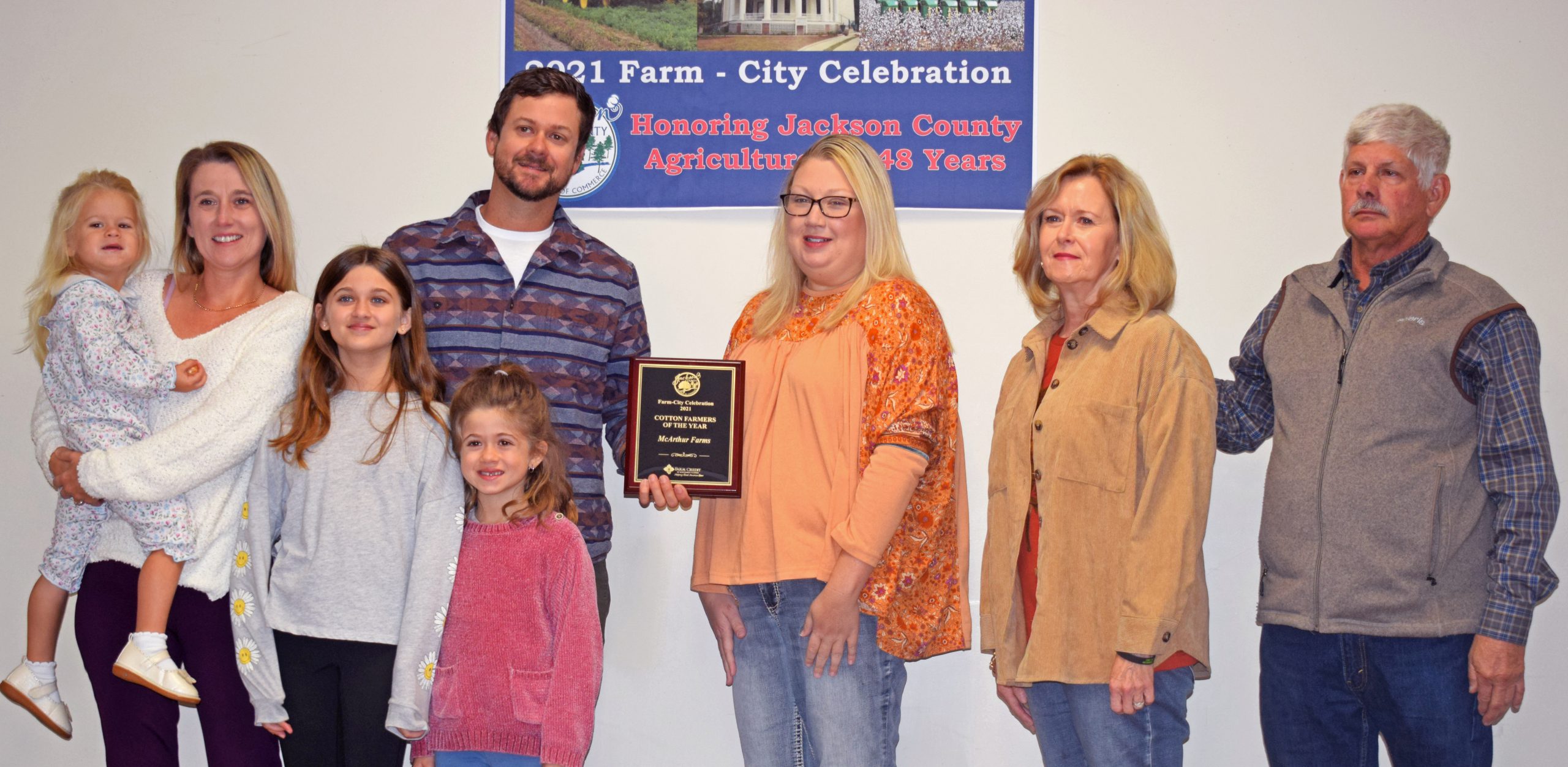
–
2021 Corn Farmers of the Year – Dietrich Farms
This year’s recipient for Corn Farmers of the Year is Dietrich Farms. Each year, the Jackson County Extension Service performs standardized corn yield checks across the county for all interested growers. Annually, the farm or grower with the highest yield check earns this recognition.
This year, Dietrich Farms grew 120 acres of cotton, 270 acres of peanut, and 225 acres of corn, 150 acres of soybeans, 70 acres of brown top millet, as well as managing a 100 cow commercial cattle herd. They have a three-year rotation and corn fits nicely with peanut and cotton. On average, they grow about 225 acres of corn each year, and are planning on 225 acres for the upcoming 2022 cropping season.
Dietrich Farms is truly a family business. Gordon & Christopher manage the day-to-day activities on the farm and Lady is responsible for bookkeeping, although she helps in the field during corn, peanut & cotton harvest. The fourth generation also helps out and is gaining experience on the farm firsthand. Christopher and his wife Holly live on the farm and have four boys, Jackson, Cale, JB, and Whit. When Holly isn’t teaching 2nd grade at Kate Smith Elementary School, she helps on the farm and enjoys working with the cattle. Gordon & Lady’s daughter, Hannah and her husband Mark live in Chipley with their three kids, Shelby, Cooper, and Cannon who can also usually be found around the farm. Their son Nicholas and his wife Chelsea live in Panama City and visit the farm as often as time allows. This year, Jackson who is 12 years old helped unload corn, while 10 year old Cale ran the dump cart and even took a turn on the combine.
At Dietrich Farms, crops are grown on 30-inch row spacing, all their corn crop is irrigated and planted in single rows. This year’s planting dates were March 25 and 30th, and they had 7 variety lines on their farm including some from Dyna Grow, Pioneer, Dekalb and Local. The average corn yield from 7 tests across different varieties on Dietrich Farms in 2021 was 252 bu/acre. Their official top yield for the year was 275 bu/acre, achieved with Dekalb 6208. This was the first year they had a yield monitor in the combine, and they plan to take that data to help make future decisions on the farm. Behind the corn they plant oats to utilize as grazing for their cattle.
Dietrich Farms would like to give special thanks Adam Scarboro with Helena Chemical Company, and Ronald Barber of Campbelltown Farm Service for their assistance with all their seed, fertilizer, and chemical needs. Adam provides input on varieties and scouting for pests and disease. All their fertilizer comes from Barber Fertilizer, who also supplies the moisture meter and scales used for their yield checks. Their neighbor Clarence Bellamy, a long-time educator in Jackson County, now retired, helped with peanut harvest by running a picker. Lastly, thanks to Ethan Carter who came out on Saturday and Sunday to do yield checks just before the arrival of Hurricane Fred that dumped 5” of rain.
The Corn Farmer of the Year Award is based on standardized yield checks provided by the Jackson County Extension Service. If you would like to have your corn yield checked, contact Ethan Carter to make an appointment at harvest time.
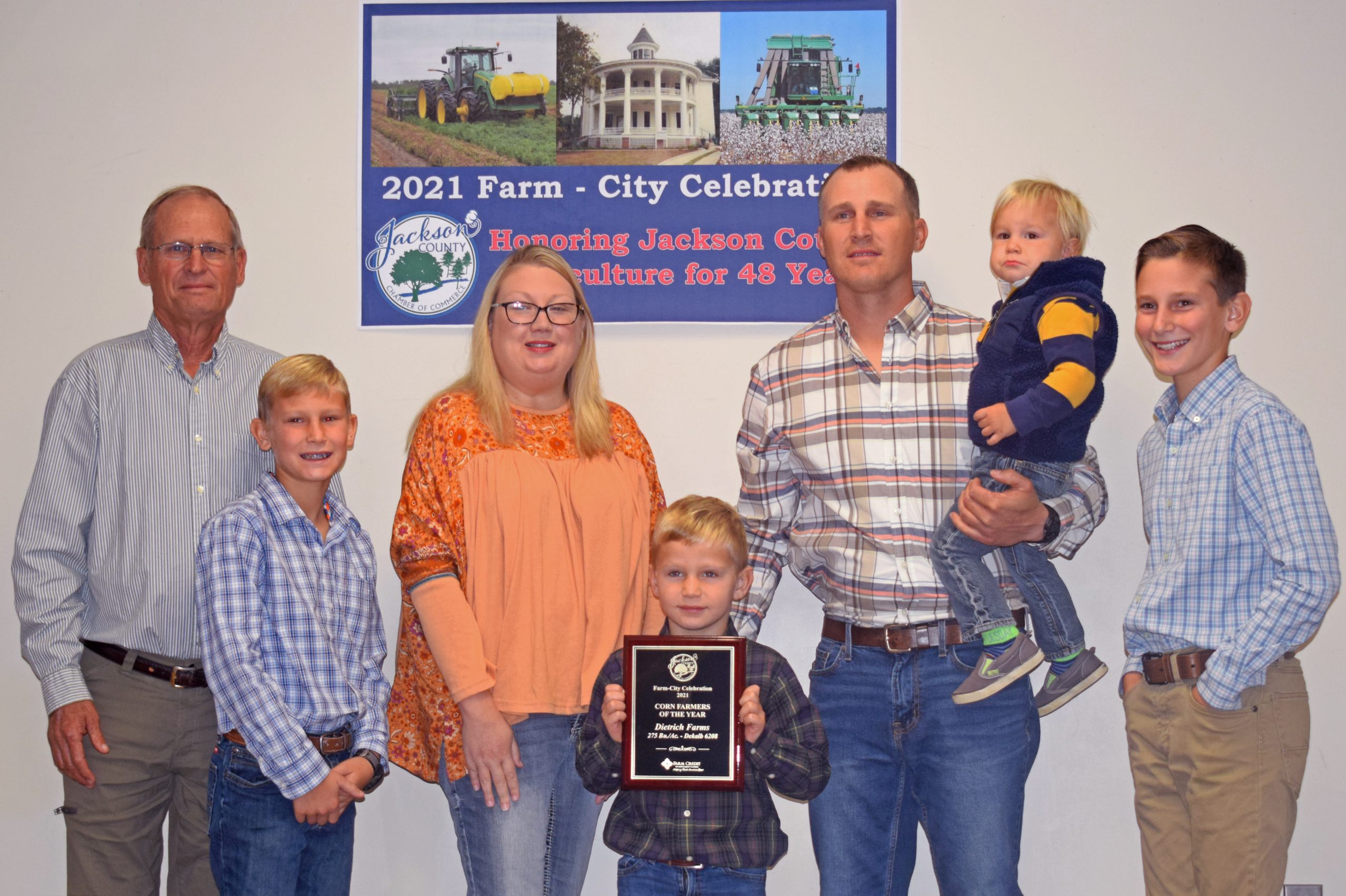
–
2021 Cattleman of the Year – Michael Thompson
In 1947, two WWII veteran brothers, J.R. and Bruce Thompson bought 80 acres of land and started farming together as partners. They started as crop farmers with a commercial cattle herd, but in 1955 purchased registered Angus cows from R.D Bennett. Three generations of Thompsons developed a dynamic herd of Angus Cattle that fit the needs of Florida Cattlemen and have made a significant impact on the cattle industry in this state. Michael Thompson has lived on the farm on Thompson Road all 48 years of his life and has been the farm manager since 1993 (28 years). He currently has two fulltime employees, and his mother JoAnn still helps him with the billing, banking, and errands in town.
There has been considerable progress made since the original heifers were purchased 66 years ago. The Angus herd today consists of 150 cows with proven performance. Once thing Michael shard that he is very proud of is that “Our cows produce in a tight management schedule with a consistent 90 day breeding season, or they don’t stay in the herd.” Michael utilizes artificial insemination for his replacement heifers but uses young high performance bulls on a two year rotation for the adult cow herd. He has a market for high quality three-year-old bulls after his use. This allows him to continuously bring in fresh genetics through the high quality yearling bulls he purchases from the top herds in the region. After years of hauling bulls to Bartow for the Florida Angus Bull Sale, Michael built strong relationships with Central Florida ranchers. Now he has 10 volume customers that count on him for their replacement bulls every year that are sold direct from the farm.
While Thompson Bothers Farm is primarily known for their registered cattle operation, it is a truly a diversified farming operation. Michael said, “It is not just one main thing, but it’s the big picture.” He explained this statement by saying you can’t just rely on one source of income but need every phase of the farm to provide income. In addition to the registered cattle herd, they also raise peanuts, corn, oats, and hay that provide feed for the cow herd, but are primarily sold from the farm for additional income. The farm has 200 acres of Bermudagrass for hay production, but their primary sources of supplementation for the cow herd is oat baleage planted behind peanut and corn crops. The farm produces 4,000 bales of hay and baleage annually with the majority being sold to other farms in the area for additional income. Michael also takes advantage of the opportunity to sell Argentine bahiagrass sod from the pastures before they are converted to peanut production.
Herd nutrition has always been a major element for managing the herd. You might say Michael earned a master’s degree in cattle nutrition from the University of “We’ll Try That.” Over the years he experimented with almost every type of bulk by-product feed on the market, and even some experts were uncertain of. Through his willingness to try different byproducts, he came across one in particular with real merit, “Peanut skins.” Yes, those little red skins on a roasted peanut that are sort of bitter, can be purchased by the truckload and fed to cattle. While it is a pain to handle those fluffy skins that blow in the wind, they provide some real benefit to cattle feeding. #1 they are relatively cheap, #2 peanut skins provide both protein and fat, and #3 They also serve as an intake limiter. The bitter taste from tannic acid and the bulkiness of the fluffy skins keep cattle from overconsuming the blended feed. So instead of having to limit feed every day, Michael developed a feed blend that could be fed a few times per week all winter to supplement the hay and baleage.
Once he had experimented enough to develop the perfect blend of peanut skins, corn gluten feed and soyhulls, his neighbors started using it too. Today he handles enough bulk feed to reduce the cost of feeding his own herd, and to help pay for his feed-man. Last year Michael purchased 75 semitruck loads of by-product feeds. Three quarters of the blended feed was sold off the farm. The bulk feed business was not something Michael was looking to develop, but it has become a real benefit to his farm and to numerous cattle operations in the area.
Michael currently serves a s a member of the Jackson County Farm Bureau Board and has served in past years on the County Cattlemen’s Board of Directors. Michael’s greatest asset to the farming community is his willingness to share with fellow farmers. Whether it is suggestions about Angus cattle, ways to feed cattle, or just common sense farming ideas from years of trying things that both have and have not worked, Michael is never too busy to stop working for a few minutes to talk. If you ask his opinion, you will not leave wondering where he stands. He is more than happy to share his wisdom and ideas, especially if he thinks he knows a way to save time and money.
J.R. and Bruce Thompson were recognized as the as the Outstanding Farm Family in 1988, and the Cattlemen of the Year in 2000. Michael, his mother Joann, and sister Amy were recognized as the Outstanding Farm Family in 2017. Michael Thompson is certainly worthy of this year’s recognition as the 2021 Jackson County Cattleman of the Year.
The Cattleman of the Year is recognized annually by the Jackson County Cattlemen’s Association. Nominees are selected by a committee of past recipients of this prestigious award.

–
Hay Farmer of the Year – Bill Conrad
Bill Conrad is a 4th generation Jackson County farmer who farms north of Highway 2 in the Bascom Community. Over the years, he has raised a number of traditional crops including peanuts, soybeans, corn, wheat, triticale, and pine trees. For the past decade, however, he has shifted his focus to become a quality hay producer for horse, goat, beef, and dairy farms. One thing that sets Bill apart from his competitors is that he sends in hay samples for quality testing from each cutting. He is able to market his hay on more than just reputation but can show the unbiased lab test results to prove the quality of his hay is high.
For the first time since the Southeast Hay Contest began in 2004, a Florida forage producer won top honors. There were 387 entries submitted by hay producers from nine states that entered hay and baleage samples into this year’s competition. The winner of the 2021 Southeast Hay Contest was Bill Conrad, who was recognized at the Sunbelt Ag Expo, in October. The overall winner (highest RFQ index) received $1,000 and a choice of the use of a new Massey Ferguson DM Series disc mower or an RK Series rotary rake for the 2022 hay production season.
Bill, and his son Joe, primarily raise perennial peanut, and alfalfa to square bale and sell to horse and goat farms. This year they tried something new and grew crimson clover. Their crimson clover square baled hay turned out to be the best hay in the entire Southeast, and the highest quality hay the farm had ever produced. This crimson clover hay had an RFQ of 297, with 20.5% crude protein (CP), and 74.5% total digestible nutrients (TDN) on a dry matter basis. They also took 2nd place in the Perennial Peanut Hay category with an entry that hay had an RFQ of 202, 19.2% CP, and 65.8% TDN.
Of course, Bill’s crimson clover hay was also the highest quality hay grown in Jackson County in 2021. This is the eighth straight year that Bill has been recognized for producing the best hay in Jackson County.
The Hay Farmer of the Year award is based on locally grown hay with the highest Relative Forage Quality or RFQ score. RFQ is a single number index that considers protein, energy, fiber, and digestibility of hay, which allows for easy comparisons between cuttings and different forage types. Entries into this annual contest are now accepted year round, so contact the Jackson County Extension Office to have your best hay cuttings sampled and submitted into next year’s competition.
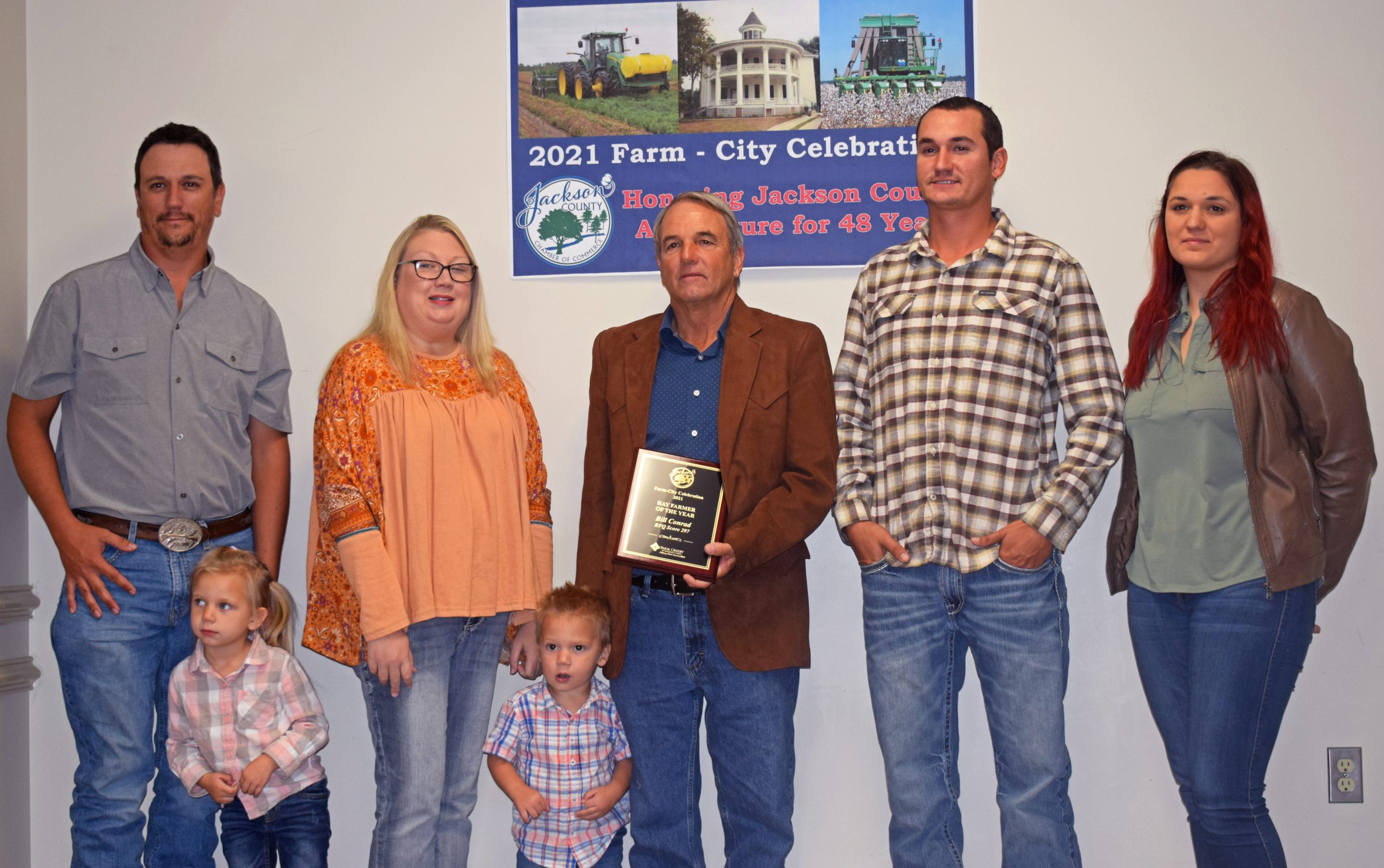
–
Specialty Crop Farmer of the year – Martin’s Harvest
In 2014 Tonya Martin and her family were living in Mississippi and were working around the clock running two different food service businesses. That year Tonya was stumped and asked her husband what he would like for Father’s Day? This year was different, he didn’t need anything, and his response was hydroponics.
Hydroponics is a method of growing plants in liquid nutrient solutions rather than soil. The Martin’s started experimenting with a hobby sized small raft, deep water culture system that expanded to an indoor 400 sq ft grow room. In August of 2019, the Martins were ready for a change in life and decided to sell both of their businesses, their house and moved to Marianna to start a farm. Martin’s Harvest was founded by Walter and Tonya Martin in 2020 based on a love for growing vegetables. The Martin’s have an advanced enclosed system that recirculates the water, so the plants only use what they need. Their mission is to provide fresh, eco-friendly high-quality lettuce varieties and micro greens in compostable, biodegradable packaging. They only use organic labeled pesticides, and the hydroponic system eliminates the need for herbicides.
Currently, the Martin family operates a 4,000 sq ft year-round climate control greenhouse and a small field for seasonal vegetables as well. They are currently growing arugula, butterhead, spring mix, stir-fry blend, romaine, red-leaf crisps, kale medley, micro greens, and more. The business has grown quickly in just two years, with sales currently to 10 states. They also selling at the Marianna Farmer’s Market, through Facebook, and their website https://www.martinsharvest.com, and local marketing.
This is a family run business. Tonya does the social media, website, and marketing while her husband Walter does the harvesting, transplants, and general maintenance of the greenhouse. Her daughter Alyssa handles the packaging of the fresh greens. In the near future, the Martin’s Harvest are considering adding agrotourism to be able offer more to the public at their current location.
The Specialty Crop Farmer of the Year is selected annually by the Jackson County Extension Service Staff with assistance from the local farming industry.
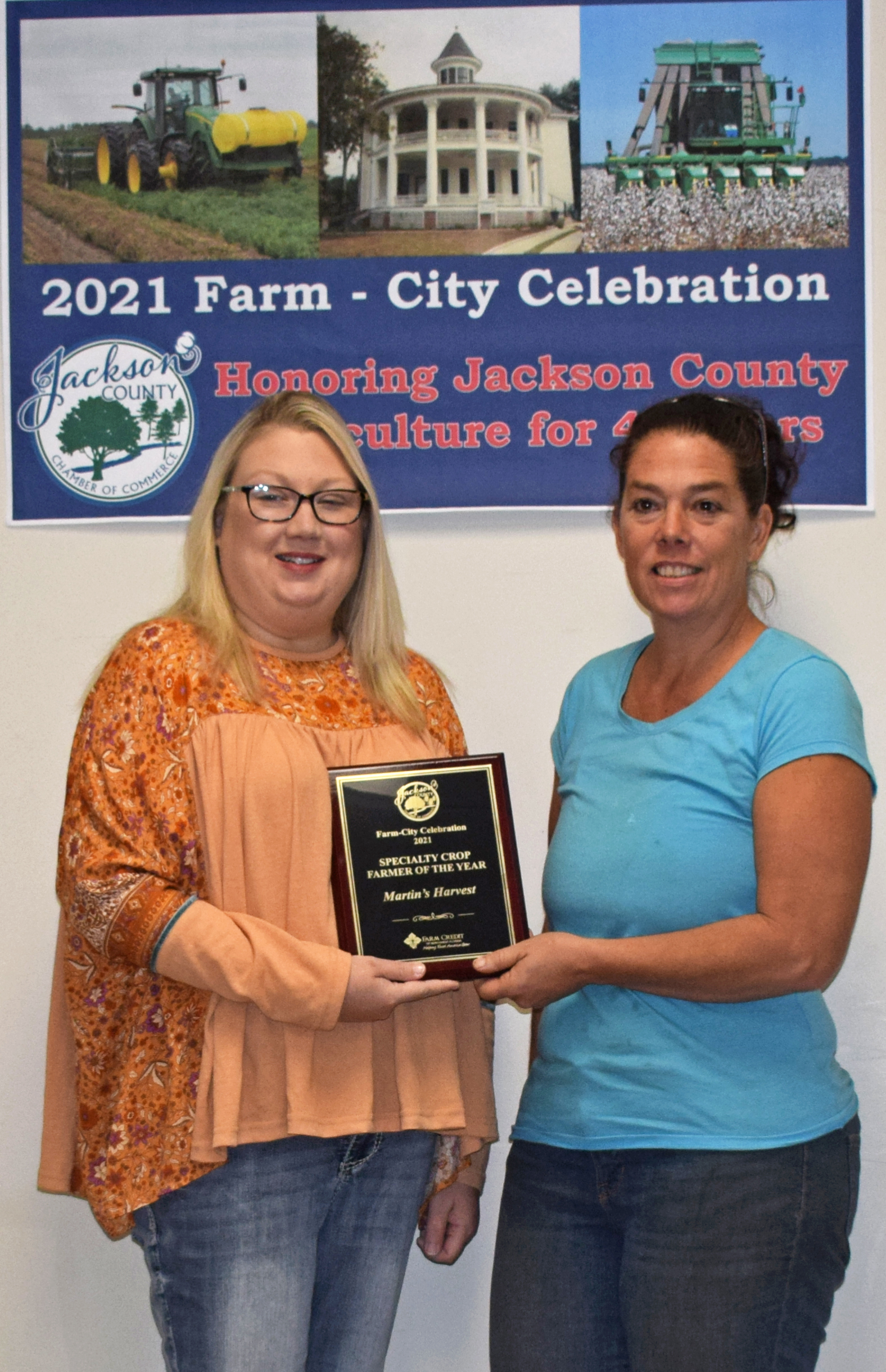
–
Tree Farmer of the Year – Dennis M. Pete
Dennis Pete is a second-generation pine tree farmer. He manages the Big Pine Ranch, Bellamy Bridge, and Truffle Hill Farm properties, all located in rural Jackson County. The destruction by Hurricane Michael in October 2018 resulted in his personal loss of 214 acres of mature pine trees ranging in age from 19-24 years.
Starting in November 2018, Dennis launched an aggressive cleanup initiative using his trusty Bobcat to clear stands, repair service roads, restore fencing, and pile debris. As a Certified Pile Burner, he applied his extensive experience and training in the management of controlled burns involving large scale debris. While Dennis handled most of the manual labor, a contractor was hired for the heavier tasks, particularly those requiring specialized equipment.
Post-cleanup goals were completed by the winter of 2019. During this time, Dennis sprayed, and replanted 14 separate tracts of previously destroyed acreage. As part of his replanting strategy to achieve optimum growth, he selected genetically superior varieties including Varietal Loblolly, Elite Loblolly, MCP Select Loblolly, MCP Elite Loblolly, and MCP 2.0 Loblolly. In the spring of 2020, Dennis purchased an additional 40 acres which he cleared, burned, and planted with MCPs. In 2021, Dennis has secured an additional 10 acres which he has cleared and burned with the intention to plant MCP 2.0 pine trees in December.
Dennis and his wife, Dr. Evelyn Pete have dedicated themselves to actively managing these tracts for timber and wildlife habitats. Both are graduates of the University of Florida’s Master Tree Farmer Program. Dennis was previously selected as Tree Farmer of the Year in 1999 and 2011. Dennis and his daughter Tiffaney are both members of the Florida Forestry Association.
Currently, Dennis manages more than 750 acres of forest dedicated to pine tree cultivation alongside thriving native wildlife habitats that include wild turkeys, birds, and deer. His succession planning efforts now involve his daughter, son, and grandchildren in all aspects of timber management, including annual updates to the Forest Stewardship Management Plan associated with the Big Pine Ranch, Bellamy Bridge, and Truffle Hill Farm properties.
The Tree Farmer of the Year is selected each year by the Florida Forest Service’s County Forester, Barry Stafford, based on his interactions with tree farm operators each year.
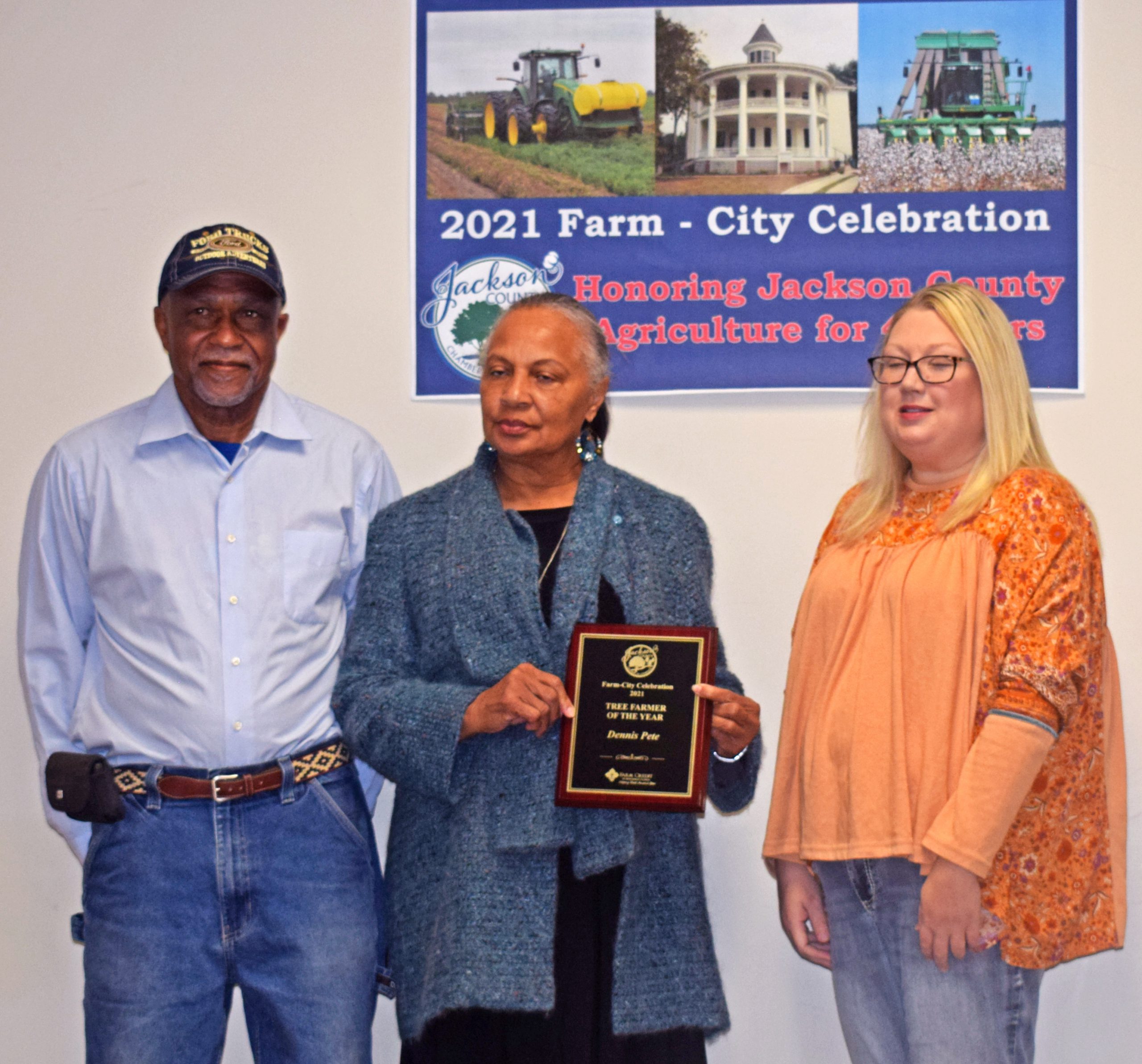
–
Conservationist of the Year – Ronald W. Stephenson
The first inductee to America’s Conservationist Hall of Fame was Teddy Roosevelt. President Roosevelt planted the path for so many future conservationists to “work for wildlife,” which is exactly what Ronnie Stephenson says over & over in just about every conversation he has with the people he meets. On his farm near Cottondale, Ronnie is very proud of the wildlife habitat he has created and managed.
After many years of owning and managing a motel at the beach, the Stephenson’s bought land in Jackson County. The Stephenson’s currently own two farms where Ronnie has concentrated his efforts to make healthy wildlife areas bordering all the crop fields and perimeters of their land. Think of it as wide pathways of a variety of grasses, plants, and trees that all grow together to feed, provide cover and open corridors for wildlife to feed and travel through around the fields. He also converted an old rodeo arena on a part of the property to propagate native grass varieties for developing quail habitat.
Ronnie has added a number of different types of plants to enhance the wildlife habitat on his farms. One example is the bi-color Lespedeza, which produces a hard seed and blooms in the fall, so it provides both nutrition and cover for quail. He has also planted pecan trees he grafted all along the fence rows along with pines and oaks. He cold stratifies chestnut seeds and plants them in PVC tubes to start them out before spacing them out throughout his wildlife corridors. Ronnie says, “The deer absolutely love chestnuts!”
With technical assistance and cost-share funds from the Natural Resource and Conservation Service (NRCS), Ronnie has successfully established native grass and long leaf pine plantings. Through the Environmental Quality Incentive Program (EQIP), he has been able to utilize prescribed burning and other tools to control vegetation overgrowth along with eradication of invasive species.
Ronnie planted 28,000 pine trees 25 years ago, but Hurricane Michael ruined the stand. He has spent a lot of time and energy over the past three years on debris cleanup, but he still has much more work to do. Even so he has not lost sight of what is most important, as the Stephensons made time to celebrate their 50th wedding anniversary this year.
Because of his dedication and steadfast work to create and maintain wildlife habitat on his private land, Ronald Stephenson was selected for recognition as the 2021 Conservationist of the Year.
The Conservationist of the Year is selected each year by the staff of the Jackson District of the USDA’s Natural Resource Conservation Service (NRCS). Farmers are encouraged to make an appointment to meet Brendaly Munoz, our new District Conservationist, at the NRCS Office on Penn Ave and apply for conservation practice technical assistance and cost-share funding.
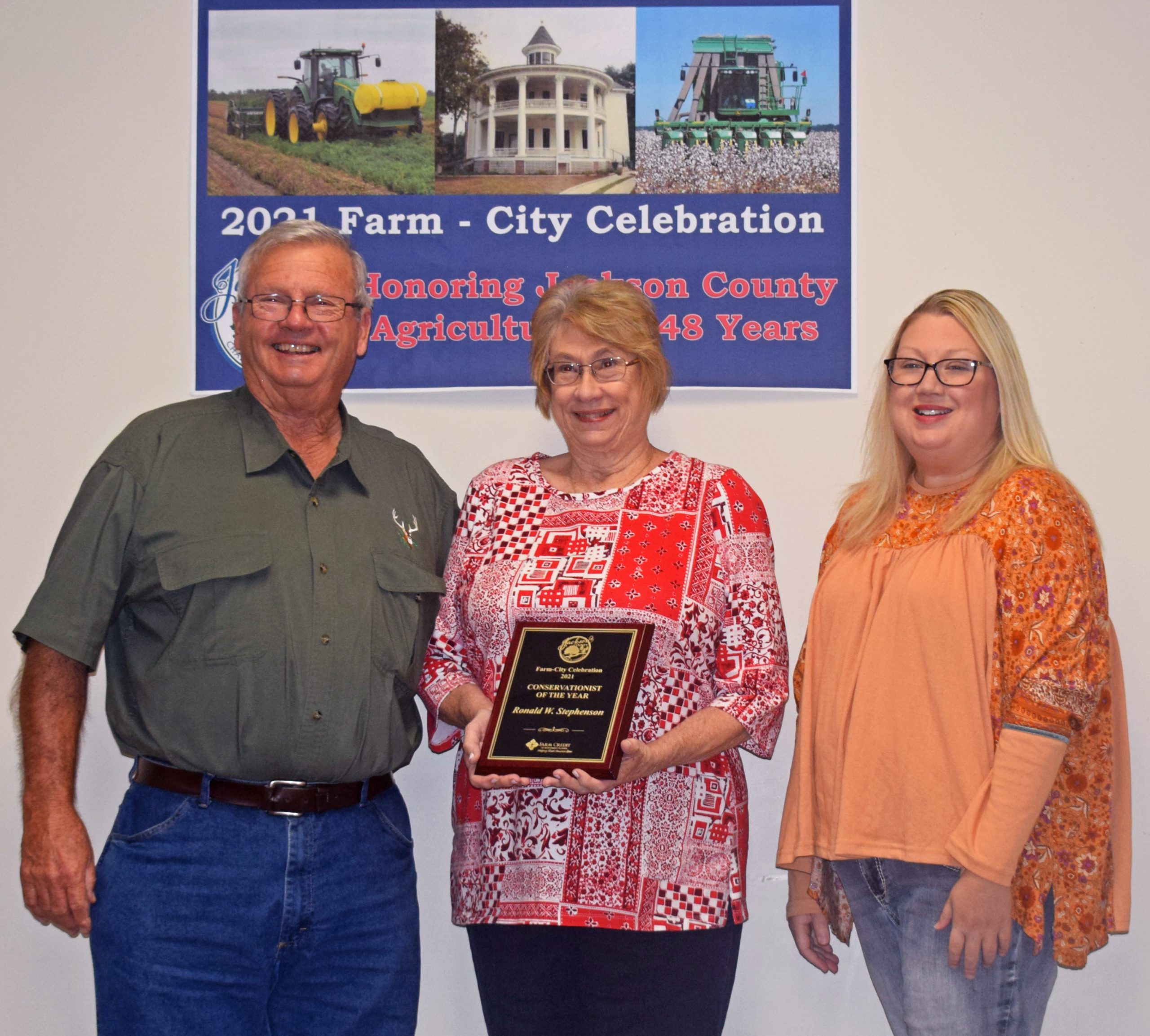
–
This Farm CARES Recognition – McArthur Farms
In 2001, the County Alliance for Responsible Environmental Stewardship, or CARES program, was created. Two decades later Farm Bureau continues to publicly recognize farmers and ranchers who demonstrate exemplary environmental stewardship by implementing Best Management Practices, or BMPs, on their farms and ranches. Through the implementation of BMPs, Florida farmers and ranchers have shown a sincere commitment to protecting our state’s natural resources and Farm Bureau is proud to recognize them for their efforts.
Farm Bureau is fortunate to partner with both the Florida Department of Agriculture and Consumer Services and the University of Florida/ IFAS for the CARES program. We are appreciative for the trusted relationships they build with producers to help advance their conservation efforts.
As part of the CARES program, recipients are awarded a customized “This Farm CARES” sign to display at their farm gate or headquarters. This sign communicates to the general public that Florida farmers and ranchers are committed to protecting local natural resources. To date, more than 900 Florida farm families proudly display a CARES sign on their property.
This year’s recipient produces cotton, corn, peanuts and small grains on more than 1,000 acres near Malone. To accomplish their goals of reducing water and nutrient use as well as protecting water quality, Best Management Practices have been implanted for more than a decade now. Some of the most effective practices implemented include enhanced irrigation systems, precision application systems and GPS guided equipment. The nominator for this year’s recipient was Garrett Williams from the Jackson Soil and Water Conservation District. Garret described the McArthur family as a shining example of farmers who love the land continuously desire to be good environmental stewards of the land under their care.
Florida Farm Bureau is proud to award exemplary environmental stewards and this year’s CARES award is being presented to Jim and Larry McArthur and family, because McArthur Farms cares about protecting natural resources.
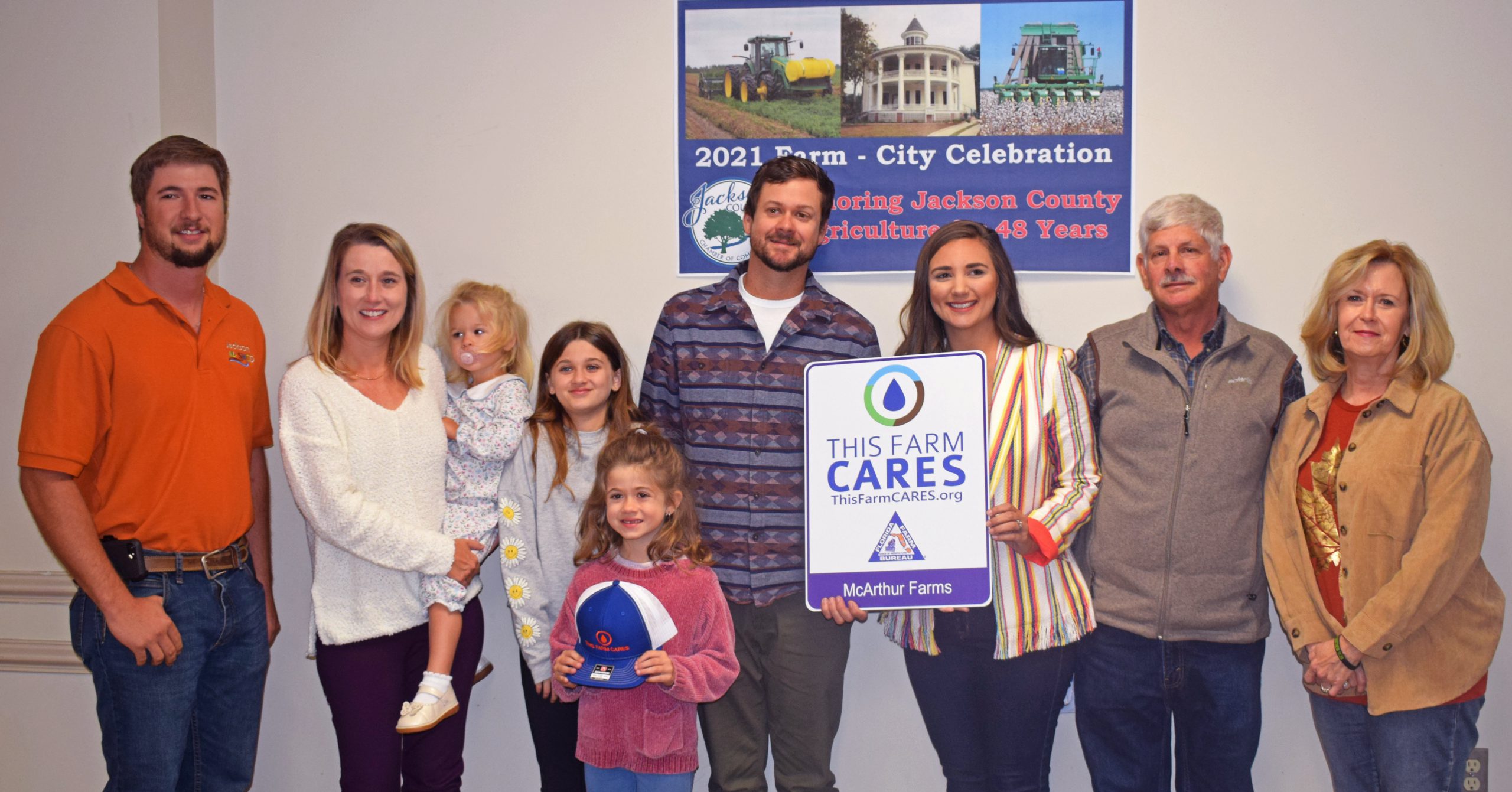
 0
0
